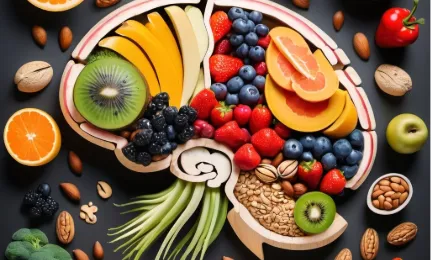
The Link Between Nutrition and Mental Wellbeing
The Link Between Nutrition and Mental Wellbeing
In recent years, the connection between nutrition and mental health has gained significant attention from both the scientific community and the general public. As we increasingly understand the intricate relationship between what we eat and how we feel, it's becoming clear that our diet plays a crucial role in maintaining emotional well-being and promoting mental wellness. This article explores the link between nutrition and mental wellbeing, offering insights from research and practical tips for improving your mood and cognitive function through dietary choices.
How Nutrition Affects Mental Health
The Brain-Gut Connection
One of the most fascinating discoveries in this field is the concept of the brain-gut connection. The gut, often referred to as the “second brain,” houses a vast network of neurons and produces a significant amount of neurotransmitters, such as serotonin, which is crucial for mood regulation. A healthy gut can enhance mental clarity, improve mood, and reduce anxiety. Research suggests that a diet rich in probiotics, such as yogurt, kefir, and fermented vegetables can have a positive impact on gut health and, by extension, mental health.
Micronutrients and Mental Health
Micronutrients, including vitamins and minerals, are essential for brain function. For example, B vitamins, particularly B6, B12, and folate, play a key role in the production of neurotransmitters. Deficiencies in these vitamins are linked to symptoms of depression and decreased cognitive function. Omega-3 fatty acids, found in fish, flaxseeds, and walnuts, are known for their anti-inflammatory properties and have been shown to reduce symptoms of depression and anxiety.
Sugar and Mental Health
High consumption of sugar and refined carbohydrates can lead to blood sugar spikes and crashes, which may contribute to mood swings, irritability, and fatigue. Studies have shown that diets high in sugar are associated with an increased risk of depression. Opting for complex carbohydrates, such as whole grains, fruits, and vegetables, can help maintain stable blood sugar levels and support mental wellbeing.
Practical Tips for a Nutrient-Rich Diet
Incorporate Whole Foods
Eating a diet rich in whole foods, such as fruits, vegetables, lean proteins, and whole grains, provides the body with the essential nutrients it needs to support brain health. Avoiding processed foods and sugary snacks can also help prevent mood swings and maintain energy levels throughout the day.
Include Omega-3 Fatty Acids
Incorporate sources of omega-3 fatty acids into your diet to support brain function and reduce inflammation. This can include fatty fish like salmon and mackerel, as well as plant-based sources such as chia seeds and flaxseeds.
Stay Hydrated
Adequate hydration is crucial for maintaining cognitive function and overall health. Aim to drink at least eight glasses of water a day and be mindful of your caffeine and alcohol intake, as these can dehydrate the body.
The Role of Supplements
While a balanced diet is the best way to obtain nutrients, some individuals may benefit from supplements, especially if they have specific dietary restrictions or deficiencies. Common supplements for mental health include:
- Omega-3 Fatty Acids: For those who do not consume fish regularly.
- B Vitamins: Particularly B12 and folate, which are essential for mood regulation.
- Vitamin D: Known as the “sunshine vitamin,” it can improve mood and alleviate depressive symptoms.
Conclusion
The link between nutrition and mental wellbeing underscores the importance of a balanced diet for emotional health. By prioritizing whole foods, incorporating essential nutrients, and staying hydrated, you can support your brain's function and enhance your mental wellbeing. As research continues to evolve, it becomes increasingly clear that what we eat not only fuels our bodies but also has a profound impact on our minds.
For those looking to make meaningful changes to their diet and overall mental health, consulting with a healthcare professional or a registered dietitian can provide personalized guidance tailored to individual needs.
For more information on how your diet impacts mental health and personalized nutrition plans, visit Nutrition and Mental Health.
Don't forget to try Samantha for improving your emotional health, personal development, and productivity. Check it out here: mysamantha.ai
